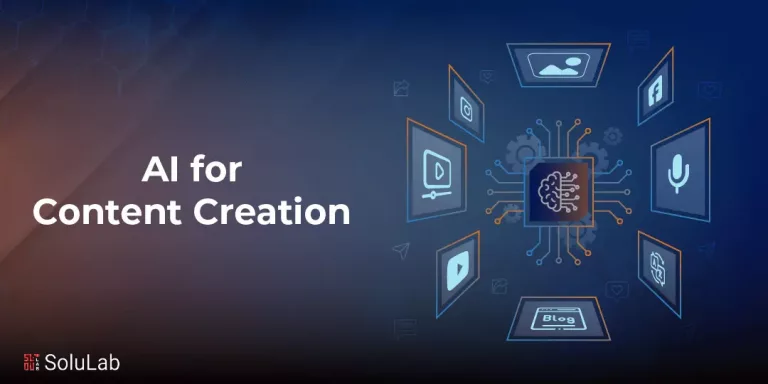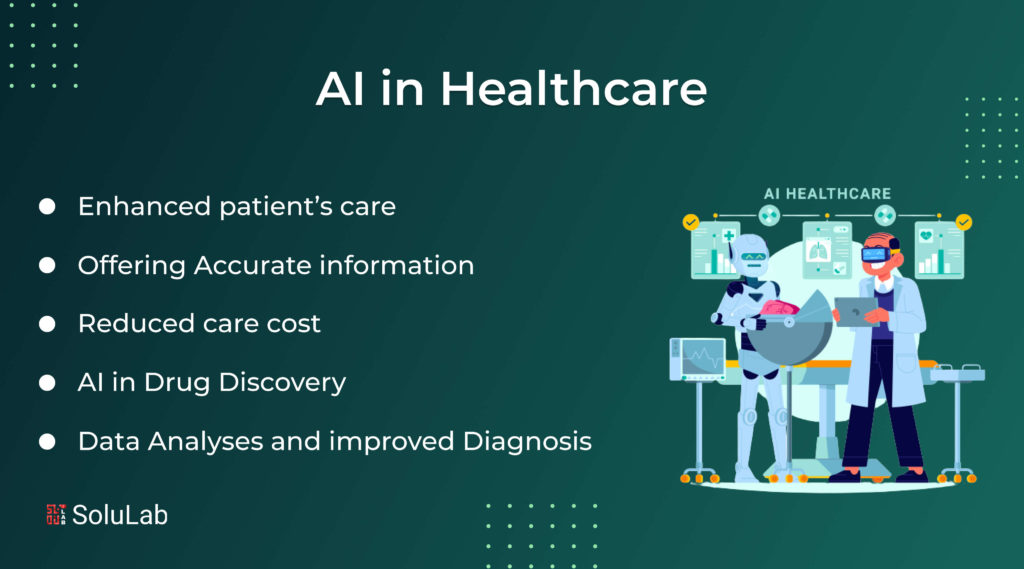
Artificial Intelligence (AI) has emerged as a transformative force in healthcare, revolutionizing how medical professionals diagnose, treat, and manage patient care. AI is making a significant impact on multiple facets of the healthcare industry:
- Enhanced Diagnostics: AI-driven diagnostic tools sift through extensive databases, identifying subtle patterns and anomalies, leading to earlier disease detection and improved patient outcomes.
- Personalized Treatment Plans: AI algorithms analyze vast amounts of data to tailor treatment strategies to individual needs, considering factors such as genetics, lifestyle, and medical history.
- Virtual Health Assistants: AI-powered virtual health assistants offer real-time symptom analysis, medication reminders, and preliminary health advice, enhancing accessibility to healthcare services and facilitating proactive self-care.
- Drug Discovery and Development: AI expedites the drug discovery process by analyzing chemical databases and predicting potential drug candidates, reducing the time and cost associated with traditional drug development.
- Remote Patient Monitoring: AI-enabled remote patient monitoring tools track vital signs and physiological data, allowing healthcare providers to monitor patients remotely and foster proactive interventions.
- Predictive Analytics: AI algorithms analyze data to predict patient outcomes, hospital readmission rates, and potential health risks, enabling proactive care management and effective resource allocation.
AI’s potential to revolutionize healthcare delivery and improve patient outcomes is boundless as it continues to evolve.
Artificial Intelligence in Healthcare
Welcome to a new era in healthcare, where technology merges with medical expertise. Artificial Intelligence (AI) is revolutionizing the industry by transforming healthcare practices, enhancing patient care, and fueling remarkable advancements in medical research. Discover how this remarkable integration is reshaping the landscape and ushering in unparalleled possibilities for improving lives.
-
Definition and Scope of AI in Healthcare
Artificial Intelligence (AI) is revolutionizing healthcare by utilizing advanced algorithms and computational models to process and analyze vast medical data. It offers numerous benefits, including enhanced diagnostic accuracy through AI-powered algorithms that detect subtle patterns in medical images. AI also assists in personalized treatment planning by analyzing patient data and medical literature, leading to improved decision-making. Additionally, AI streamlines administrative tasks, reducing the burden on healthcare staff and improving efficiency. The implementation of AI in healthcare brings forth advantages such as enhanced precision, time efficiency, personalized care, cost savings, and improved accessibility. However, challenges like data privacy, ethical considerations, and infrastructure requirements must be addressed to ensure responsible implementation and maximize the potential of AI in transforming healthcare.
-
Evolution and Adoption in the Healthcare Sector
The integration of AI in healthcare has undergone significant changes, with increasing adoption across the industry. Initially, rule-based systems were used, but they lacked adaptability and handled complex data. Machine learning (ML) models emerged, enabling learning from data and improving performance over time, and have been successfully applied in various healthcare areas. Deep learning, a subset of ML, has further advanced AI’s capabilities in healthcare, enabling it to excel in visual recognition, natural language processing, and speech recognition. AI integration has led to transformative advancements, such as AI-powered image analysis systems, ML algorithms for predicting health risks, and AI-driven chatbots for providing support. The future of AI in healthcare holds immense potential, with the ability to revolutionize medical care delivery and improve patient outcomes.
-
Challenges and Opportunities
The utilization of Artificial Intelligence (AI) in healthcare presents promising opportunities for enhanced diagnostics, personalized treatments, and better patient outcomes. However, it also brings unique challenges that must be carefully addressed to harness its full potential.
Key challenges in AI for healthcare include data privacy and security, with the need to protect sensitive patient information from unauthorized access and breaches. Ethical considerations arise regarding bias and fairness in algorithms, job displacement, and the necessity for human oversight and accountability. Integration hurdles exist due to legacy systems, fragmented data, and the lack of standardized data collection protocols.
To address these challenges, proactive and multi-faceted approaches are required:
- Establish clear data governance policies and privacy frameworks for responsible data usage.
- Develop AI algorithms with transparency and accountability to mitigate bias and ensure fairness.
- Promote collaboration and standardization among stakeholders to overcome integration challenges.
By addressing these challenges through thoughtful planning, ethical considerations, and collaborative efforts, healthcare organizations can unlock the transformative potential of AI to revolutionize patient care and improve health outcomes.
-
Key Components of AI in Healthcare
Artificial Intelligence (AI) is transforming healthcare by offering a wide range of applications. These applications have the potential to revolutionize patient care, streamline clinical processes, and enhance overall healthcare delivery. AI in healthcare encompasses three core components:
Machine Learning (ML): ML enables computers to learn from and make decisions based on data.
Applications in healthcare:
- Disease diagnosis
- Treatment recommendations
- Predictive analytics
Natural Language Processing (NLP): NLP involves the interaction between computers and human language.
Applications in healthcare:
- Clinical documentation
- Conversational AI
- Sentiment analysis
Computer Vision (CV): CV enables computers to interpret and understand visual information.
Applications in healthcare:
- Medical imaging
- Surgical robotics
- Wearable devices
These components of AI work together to enhance clinical decision-making, streamline workflows, and improve patient outcomes. As AI continues to evolve, its impact on healthcare is expected to expand.
Benefits of AI in Healthcare
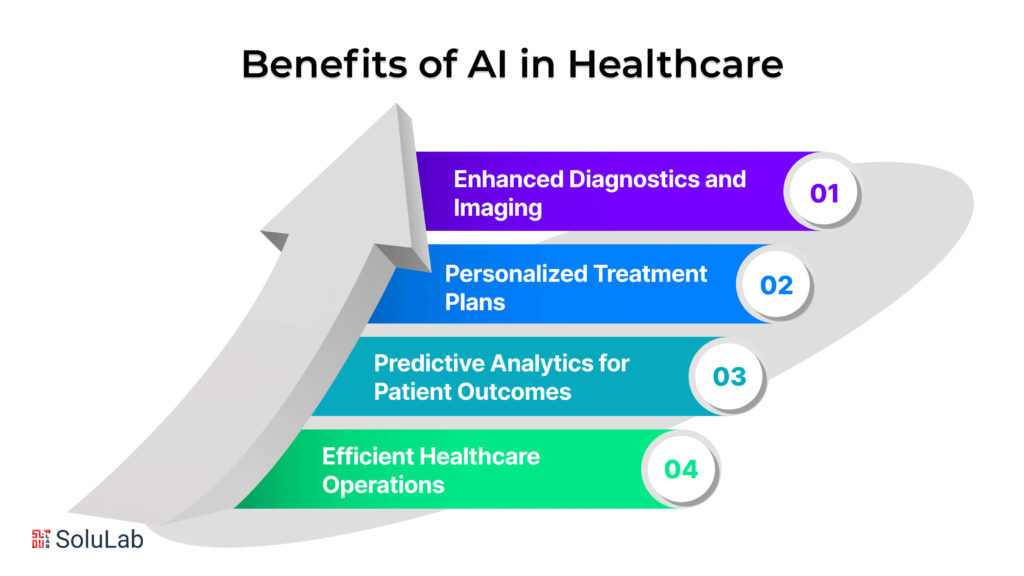
A journey to explore the vast array of advantages that Artificial Intelligence(AI) offers to the dynamic healthcare ecosystem. Witness how AI is revolutionizing patient care, from enhancing diagnostic accuracy to shaping personalized treatment plans. Let’s delve deeper into the transformative impact AI is making on patient outcomes, operational efficiency, and the overall landscape of healthcare delivery.
Enhanced Diagnostics and Imaging
The integration of AI in medical image diagnostics has revolutionized healthcare. AI algorithms analyze vast data, identify subtle abnormalities, and provide real-time decision support. This improves diagnosis accuracy, enhances patient outcomes, and reduces workload for healthcare professionals. AI assists in the early detection of diseases, enabling timely interventions and improved prognoses. By automating routine tasks, AI frees up radiologists’ time for more intricate aspects of patient care.
Personalized Treatment Plans
The integration of Artificial Intelligence (AI) in healthcare has brought about transformative changes in patient treatments. By leveraging advanced algorithms and data analysis, AI enables the creation of customized treatment plans tailored to each patient’s unique characteristics. This shift offers several key advantages:
- Precision Medicine: AI facilitates the analysis of extensive patient data, including genetic information and lifestyle factors, enabling healthcare professionals to identify patterns and predict treatment outcomes accurately. It empowers doctors to provide targeted and personalized interventions that cater to each patient’s needs.
- Optimized Treatment Outcomes: Customized treatment plans guided by AI significantly enhance the effectiveness of interventions. By identifying the most suitable options, AI minimizes trial-and-error approaches, reduces adverse side effects, and leads to improved outcomes, higher success rates, and faster recovery times.
- Patient-Centric Approach: AI actively involves patients in the decision-making process through AI-driven tools and platforms. Patients can access information about their conditions, treatment options, and potential outcomes. This transparency fosters collaboration between patients and healthcare providers, ensuring treatment plans align with individual preferences and values.
- Cost-Effective Healthcare: AI-enabled customization contributes to cost savings by optimizing treatments and reducing adverse events. It also analyzes large datasets to identify cost-effective options, aiding healthcare providers in making informed resource allocation decisions.
AI in healthcare has opened new avenues for personalized and precise treatment plans. Customizing interventions based on individual patient data leads to more effective outcomes, empowers patients, and promotes a patient-centric approach. As AI continues to evolve, its potential to revolutionize healthcare delivery and enhance patient experiences remains immense.
Read Blog: AI Use Cases and Applications
Predictive Analytics for Patient Outcomes
Artificial Intelligence (AI) is transforming healthcare by enhancing patient outcomes through advanced predictive capabilities. AI algorithms analyze vast amounts of historical data to identify patterns, risk factors, and potential disease progression. This predictive power enables healthcare professionals to take proactive and preventive measures, personalize care plans, and optimize treatment strategies.
For instance, in cardiology, AI algorithms can assess cardiovascular risks and predict heart disease, enabling early identification and timely interventions. In oncology, AI analyzes genetic data and imaging results to predict cancer progression and response to treatments, enabling personalized therapies and improved outcomes.
AI’s predictive capabilities extend to population health management, helping identify trends, predict disease outbreaks, and allocate resources efficiently. By harnessing AI’s predictive power, healthcare systems can shift to proactive care models, empowering individuals to take control of their health and enhancing overall quality of life.
Efficient Healthcare Operations
Artificial Intelligence (AI) has significantly transformed healthcare administration, streamlining mundane tasks and enhancing efficiency. AI-powered systems now handle various administrative responsibilities, including scheduling appointments, processing medical bills, and optimizing resource allocation. These automation efforts result in substantial cost reductions and improved healthcare delivery quality and efficiency.
AI-driven scheduling platforms leverage historical data and patient preferences to create optimized schedules, reducing wait times and maximizing satisfaction. Automated billing processes, facilitated by AI, minimize errors and improve cash flow for healthcare providers. Additionally, AI algorithms analyze vast amounts of data, enabling strategic resource allocation, leading to cost reduction, enhanced operational efficiency, and critical resource availability. By utilizing AI, healthcare administration can shift its focus from administrative tasks to exceptional patient care. AI’s potential to transform healthcare administration is limitless, aiming for a more efficient, cost-effective, and patient-centered healthcare system.
AI Applications in Healthcare
Delve into the multifaceted applications of Artificial Intelligence (AI) in the healthcare industry. Discover how AI transcends its role as a mere tool and becomes a catalyst for transformation, impacting diagnostics, drug discovery, predictive analytics, and more. Explore the profound ways in which AI is reshaping the healthcare landscape, bringing about tangible advancements and revolutionizing patient care.
AI in Drug Discovery and Development
Artificial Intelligence (AI) is revolutionizing drug discovery, leading to significant advancements in the pharmaceutical industry. AI enables scientists to analyze vast complex data, identify promising drug candidates, and optimize clinical trials, resulting in faster and more cost-effective development of new medications.
AI contributes to drug discovery in several ways:
- Data Analysis: AI algorithms uncover hidden patterns in large datasets, providing deeper insights into disease mechanisms and potential treatments.
- Virtual Screening: AI-powered tools rapidly assess compound libraries, reducing the time and costs associated with traditional screening methods.
- Drug Design: AI algorithms design and optimize novel drug molecules with improved properties based on specific criteria.
- Clinical Trial Optimization: AI identifies suitable patient populations, designs adaptive protocols, and predicts patient outcomes, leading to more efficient and informative trials.
- Safety and Efficacy Evaluation: AI algorithms analyze clinical trial data to identify safety and efficacy signals early, ensuring patient safety and effective drug development.
- Predictive Modeling: AI models predict drug efficacy and side effects based on structural and biological properties, guiding researchers in selecting promising compounds for further development.
The integration of AI into drug discovery transforms the pharmaceutical industry, making the process faster, more efficient, and more precise. It accelerates the delivery of new and effective treatments, improving healthcare outcomes and saving lives.
Virtual Health Assistants and Chatbots
Virtual health assistants powered by AI revolutionize the healthcare experience. They provide instant access to support, information, and assistance. These chatbots offer personalized recommendations, answer questions, and promote proactive healthcare habits. By handling routine queries, they free up valuable time for healthcare professionals to focus on more complex patient needs. Virtual health assistants enhance communication, foster patient engagement, and optimize resource allocation. As these technologies advance, they hold the potential to transform healthcare delivery and the patient experience.
Remote Patient Monitoring
Artificial Intelligence (AI) applications are revolutionizing remote patient monitoring by enabling continuous tracking of patient health. This groundbreaking technology empowers healthcare providers to make timely interventions and effectively manage chronic conditions without the need for constant hospital visits. Here’s how AI enhances remote patient monitoring:
- Real-Time Data Collection and Analysis: AI-driven remote monitoring devices collect vast amounts of patient data, including vital signs, activity levels, and medication adherence. Advanced algorithms analyze this data in real time, providing healthcare professionals with a comprehensive view of a patient’s health status.
- Early Identification of Health Issues: AI algorithms can detect subtle changes in patient data that may indicate potential health issues. This early identification allows for prompt intervention, preventing complications and the need for emergency care.
- Personalized Treatment Plans: AI assists in developing personalized treatment plans by analyzing patient data and identifying patterns. This data-driven approach ensures that treatment is tailored to individual needs, leading to better outcomes.
- Enhanced Medication Management: AI helps monitor medication adherence and provides reminders, reducing the risk of missed or incorrect doses. It can also detect potential drug interactions, ensuring patient safety.
- Remote Care Coordination: AI facilitates seamless coordination between healthcare providers by sharing patient data securely. This enables specialists from different fields to collaborate and provide comprehensive care, even if they are not physically present with the patient.
- Improved Patient Engagement: AI-powered remote monitoring platforms offer user-friendly interfaces, empowering patients to actively engage in their healthcare journey. They can access their health data, communicate with healthcare providers, and receive educational resources, fostering a sense of control and well-being.
By leveraging AI in remote patient monitoring, healthcare systems can enhance the quality of care, reduce costs, and improve patient outcomes. This technology is transforming healthcare delivery by making it more accessible, proactive, and personalized.
Natural Language Processing in Healthcare
Natural Language Processing (NLP) technology enables AI systems to understand and interpret human language in medical records. This advancement has major implications in healthcare, improving data extraction, documentation accuracy, and information retrieval. NLP uses algorithms and machine learning to analyze unstructured medical data, identifying clinical concepts and relationships. It aids in creating structured electronic health records, which are more accessible and facilitate better patient care, diagnoses, and clinical decisions. NLP also extracts vital information from medical literature, enhancing literature reviews and clinical decision-making. Its applications in healthcare are broad, ranging from automating administrative tasks to supporting personalized medicine and real-time clinical decisions. NLP holds the potential to transform patient care and clinical practice in the healthcare industry.
Use of AI in Healthcare
Discover the practical applications of AI in healthcare environments. Explore how AI enhances healthcare delivery by streamlining administrative tasks, augmenting medical decision-making, and promoting efficiency and effectiveness across various facets of the healthcare system
Telemedicine and Telehealth
AI has revolutionized telemedicine by facilitating remote consultations through virtual assistants and chatbots. It enables patients to receive medical advice and initial assessments conveniently from their homes. AI also plays a crucial role in monitoring patient’s health remotely by analyzing data from wearable devices and sensors, allowing healthcare providers to intervene proactively and personalize treatment plans. Furthermore, AI supports diagnosis and decision-making by analyzing medical images and EHRs to identify abnormalities and uncover patterns. Integrating AI into telemedicine enhances accessibility, effectiveness, and efficiency, leading to improved healthcare delivery and outcomes for patients.
Robotics in Surgical Procedures
AI-driven robotics in surgical procedures bring numerous benefits:
- Improved Precision: Robotic systems offer unparalleled precision and accuracy, reducing the risk of human error and enabling delicate procedures.
- Minimally Invasive Surgeries: AI allows for smaller incisions, less pain, faster recovery, and improved cosmetic outcomes.
- Enhanced Patient Safety: Safety protocols and real-time feedback minimize risks and errors during surgery.
- Reduced Recovery Times: Minimally invasive surgeries result in smoother recoveries and quicker returns to daily activities.
- Personalized Surgical Plans: AI helps create customized plans based on each patient’s unique anatomy and condition.
- Remote Surgery Potential: Advanced telecommunication technologies may enable remote surgeries in the future.
AI-driven robotics are revolutionizing surgery by enhancing precision, safety, and patient outcomes.
AI for Mental Health Diagnosis
AI is having a major impact on mental health assessment and treatment. AI algorithms can analyze vast amounts of data to detect patterns and provide insights into mental health conditions. This technology has the potential to revolutionize the way we identify, diagnose, and manage mental health disorders. One advantage of AI in mental health assessment is its ability to analyze large datasets quickly and accurately. This allows clinicians to make more informed decisions about diagnosis and treatment plans. AI can also identify individuals at risk of developing mental health disorders, facilitating early intervention and prevention strategies.
Furthermore, AI-powered tools can offer personalized mental health interventions tailored to each individual’s unique needs and preferences. This tailored approach enhances the effectiveness of interventions, promotes patient engagement, and fosters better mental health outcomes. The integration of AI in mental health assessment and treatment has the potential to revolutionize the delivery of mental healthcare services. By leveraging AI’s analytical capabilities and vast data processing power, we can enhance our understanding of mental health conditions, improve diagnostic accuracy, and provide more personalized and effective interventions.
Predictive Analytics in Preventive Healthcare
AI is transforming preventive healthcare through its predictive analytics capabilities. By analyzing patterns and risk factors, AI can identify individuals at an increased risk of developing certain medical conditions. This enables early intervention, reducing the burden on healthcare systems and improving patient outcomes. Preventive measures, such as lifestyle changes and targeted treatments, can be implemented to mitigate the likelihood of serious illnesses. AI also helps identify genetic predispositions and assess treatment effectiveness, empowering individuals to make informed decisions about their health. Incorporating AI into preventive healthcare has the potential to revolutionize health management, shifting the focus from reactive treatment to proactive prevention.
Future of AI in Healthcare
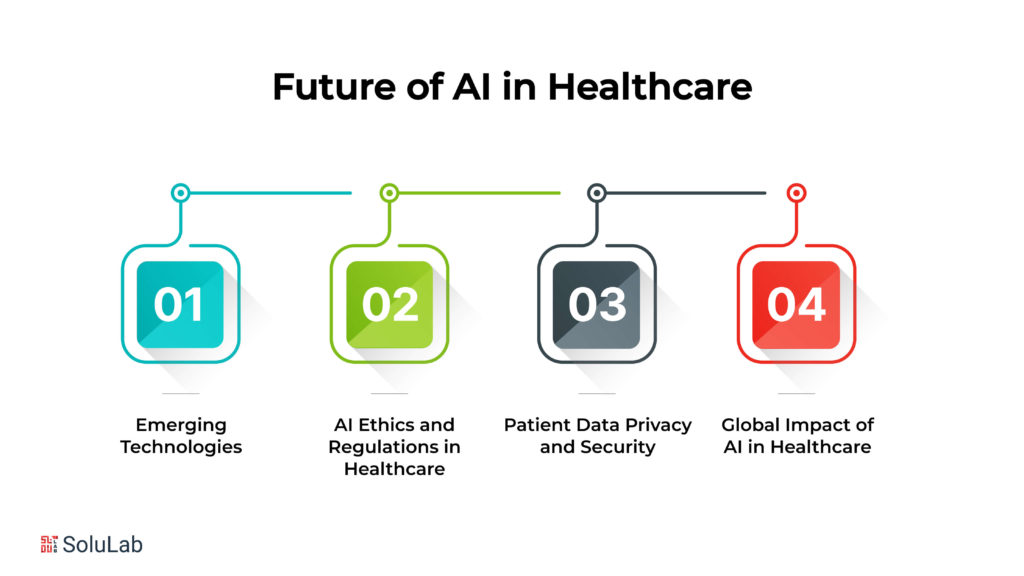
Gaze into the crystal ball of healthcare technology and catch a glimpse of the AI-shaped future. Discover emerging trends, groundbreaking innovations, and the potential for AI to revolutionize healthcare as we know it. Embark on a journey of envisioning a healthcare landscape transformed by cutting-edge AI technologies
Emerging Technologies
The future of AI in healthcare holds immense promise, driven by emerging technologies like quantum computing, advanced robotics, and sophisticated AI models. These advancements can revolutionize healthcare delivery, transforming patient care, improving outcomes, and enhancing the overall experience.
Quantum computing introduces unprecedented computational power, accelerating drug discovery, analyzing genetic data, and optimizing treatment plans. Advanced robotics automates mundane tasks, allowing healthcare providers to focus on patient care, while surgical robots improve precision and outcomes. Sophisticated AI models can diagnose diseases, predict treatment responses, and identify risks, and can also power virtual health assistants for personalized support.
The convergence of these technologies can transform healthcare delivery, but ethical and regulatory considerations must be addressed. Data privacy, security, and transparency are paramount, and robust frameworks and standards must be established to balance innovation with patient safety and trust. By harnessing the power of emerging technologies, we can create a future where AI augments healthcare professionals, leading to better care, improved outcomes, and a more efficient and sustainable healthcare system.
AI Ethics and Regulations in Healthcare
The adoption of AI in healthcare demands ethical considerations and regulatory frameworks. Ethical guidelines should focus on privacy, patient consent, and bias mitigation. Regulatory frameworks should establish data governance, certification processes, accountability, and transparency standards. By adhering to these guidelines, we can ensure the responsible use of AI in healthcare for improved patient outcomes and better healthcare delivery.
Patient Data Privacy and Security
Securing patient data is crucial for the successful implementation of AI in healthcare. Robust privacy and security protocols build trust among patients, healthcare professionals, and regulatory bodies.
Privacy Measures:
- De-identification of data: Removing direct identifiers like names and addresses before AI training or analysis.
- Encryption of data: Protecting patient data at rest and in transit.
- Access controls: Restricting access to authorized personnel using passwords and biometrics.
Security Measures:
- Firewalls and intrusion detection systems: Protecting against external threats like hackers and malware.
- Secure networks: Transmitting patient data over secure networks to prevent eavesdropping.
- Regular security audits: Identifying and addressing vulnerabilities in security systems.
Implementing robust privacy and security protocols is essential for the successful and trustworthy integration of AI in healthcare.
Global Impact of AI in Healthcare
The global impact of Artificial Intelligence (AI) in healthcare transcends individual healthcare systems, fostering collaboration and a connected approach to healthcare delivery and improvement. Collaborative efforts, shared data, global initiatives, and a unified approach to global health improvement are key aspects of AI’s transformative role.
Collaborative efforts involve the sharing of best practices, algorithms, and insights between healthcare organizations, research institutions, and technology companies, leading to enhanced AI solutions and improved healthcare outcomes. Effective utilization of AI requires large and diverse datasets, and collaborative data-sharing promotes the development of more accurate AI models.
Global initiatives set standards, provide funding, and facilitate knowledge exchange to accelerate the integration of AI into healthcare systems. AI plays a crucial role in addressing global health challenges, such as tracking disease outbreaks, monitoring health indicators, and delivering remote healthcare services, contributing to improved global health equity.
In essence, AI’s global impact extends beyond individual systems, fostering collaboration, data sharing, and a shared vision to revolutionize healthcare delivery and improve the health and well-being of people worldwide.
Applications of AI in Healthcare
Explore the remarkable advancements of AI in healthcare across pivotal applications. From radiology and pathology to virtual health assistants, witness how AI applications are transforming traditional practices, ushering in an era of heightened intelligence and responsiveness in healthcare delivery systems.
AI in Epidemiology and Disease Tracking
The integration of AI into epidemiology has revolutionized disease tracking and prediction through advanced algorithms and real-time data analysis. AI plays a crucial role in enhancing disease pattern understanding, optimizing resource allocation, and implementing effective containment measures.
Key applications of AI in epidemiology include disease surveillance, where AI algorithms identify and detect outbreaks in near real-time, enabling swift responses and targeted interventions. Further, AI processes vast data to identify risk factors and forecast disease trends, guiding resource allocation and prevention strategies.
AI also contributes to tracking disease spread by integrating data from various sources and generating detailed transmission maps. This information facilitates containment efforts, hotspot identification, and targeted interventions. Additionally, AI’s potential extends to long-term public health planning, assisting in prevention strategy development and building resilient communities and healthcare systems.
In conclusion, AI integration in epidemiology has brought transformative advancements in outbreak tracking, prediction, and response. AI empowers epidemiologists and public health experts to safeguard populations, mitigate the impact of infectious diseases, and create a healthier and more resilient world.
AI in Genomics and Precision Medicine
The integration of artificial intelligence (AI) in genomic data analysis has revolutionized precision medicine. AI algorithms can extract insights from vast amounts of genomic data, leading to more accurate diagnoses, personalized treatment plans, and improved patient outcomes.
Key areas where AI shines include identifying genetic markers associated with diseases or traits, predicting treatment responses, and tailoring therapies to individual patients. AI-driven models can simulate drug interactions and treatment outcomes, helping to identify the most effective and safest options for each patient.
In drug discovery and development, AI can identify novel drug targets and predict the efficacy and toxicity of potential drug candidates, significantly accelerating the drug development process.
As AI continues to evolve, it will play an increasingly significant role in transforming medicine and improving the lives of patients worldwide.
AI in Health Wearables
The integration of wearable technology and AI has revolutionized healthcare monitoring and management. Health wearables with advanced sensors and AI algorithms offer continuous monitoring of vital signs and provide valuable health insights. This technology enables early detection of health issues, promotes preventive care, and fosters a proactive approach to maintaining optimal well-being. By analyzing data, AI algorithms identify trends and potential health risks, empowering individuals to take timely action. Health wearables encourage healthier habits and lifestyles, reducing the risk of chronic diseases. They promote proactive healthcare by providing personalized recommendations and fostering a sense of ownership for one’s health. The synergy between wearable technology and AI transforms healthcare from reactive to proactive, empowering individuals to achieve optimal health and well-being.
AI-Enabled Rehabilitation
Artificial Intelligence (AI) is revolutionizing personalized rehabilitation by analyzing patient data, tracking progress, and adjusting interventions. AI applications enable healthcare professionals to create personalized rehabilitation plans, leading to improved outcomes for conditions like stroke, spinal cord injuries, orthopedic injuries, and chronic pain.
Key ways AI enhances personalized rehabilitation plans:
- Data Analysis: AI algorithms analyze patient data to identify patterns and trends, providing a deeper understanding of the patient’s condition and targeted rehabilitation strategies.
- Progress Tracking: AI continuously monitors patient progress through wearable devices and sensors, evaluating metrics like range of motion and muscle strength to identify areas needing improvement.
- Intervention Adjustment: AI assists healthcare professionals in adjusting and personalizing rehabilitation interventions, recommending changes to exercises, modalities, or intensity levels to optimize the patient’s recovery.
- Outcome Prediction: AI algorithms predict potential outcomes and rehabilitation trajectories based on historical data, helping set realistic goals, manage expectations, and facilitate early intervention.
- Patient Engagement: AI-powered applications enhance patient engagement by providing educational resources, reminders, and motivational support, empowering patients and promoting compliance.
AI is transforming personalized rehabilitation, allowing healthcare professionals to deliver more precise, efficient, and patient-centered care, significantly improving outcomes and empowering individuals to achieve their full potential.
Advantages of AI in Healthcare
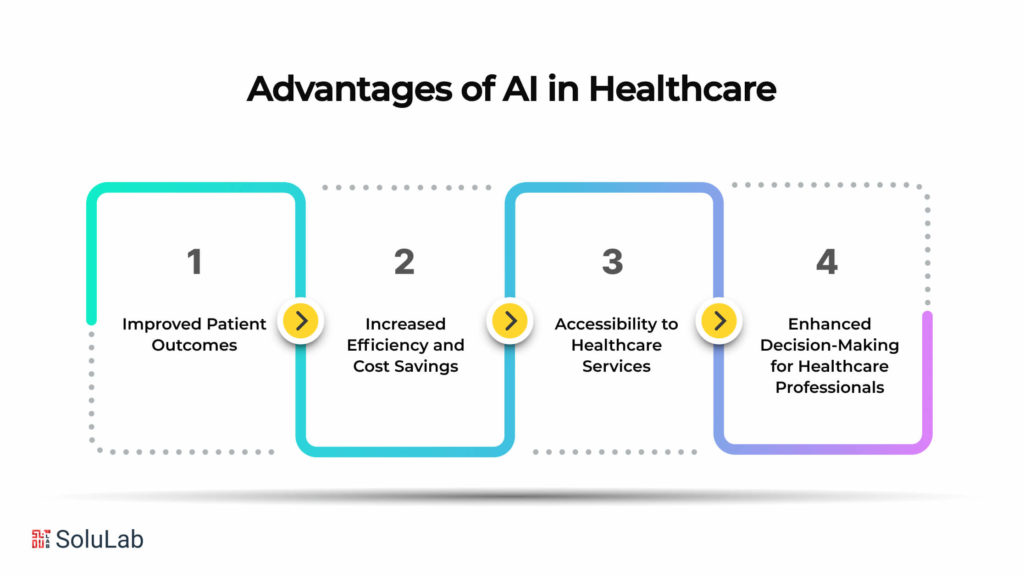
Discover the myriad of benefits Artificial Intelligence (AI) brings to the healthcare industry. From significantly enhancing diagnostic accuracy to tailoring personalized treatment plans, AI stands as a catalyst for improving patient outcomes and elevating the quality of healthcare services.
Improved Patient Outcomes
The integration of Artificial Intelligence (AI) in healthcare has led to numerous advancements, enhancing patient outcomes and the quality of healthcare delivery. AI offers key advantages including accurate diagnostics through analyzing vast medical data, enabling personalized treatments tailored to individual needs, and providing predictive analytics to anticipate potential health issues. Additionally, AI streamlines administrative tasks, improving efficiency and accessibility, and accelerates drug discovery and development processes. These transformative capabilities of AI are revolutionizing healthcare and benefiting patients worldwide.
Increased Efficiency and Cost Savings
AI applications in healthcare offer substantial financial benefits:
- Streamlined Processes: AI automation reduces costs associated with manual processes.
- Reduced Errors: AI algorithms minimize human errors, improving patient safety and eliminating financial implications.
- Optimized Resource Allocation: AI analyzes data to direct resources where needed, leading to cost savings and better patient outcomes.
- Enhanced Revenue Cycle Management: AI automates tasks like insurance verification, accelerating the revenue cycle and improving cash flow.
- Predictive Analytics for Cost Containment: AI identifies high-risk patients and patterns, enabling proactive care and reducing costly interventions.
- Improved Supply Chain Management: AI optimizes the supply chain by identifying cost-saving opportunities and maintaining optimal stock levels.
These benefits allow healthcare providers to invest in new technologies, expand services, and enhance the quality of healthcare delivery.
Accessibility to Healthcare Services
AI-driven technologies such as telemedicine and virtual health assistants have revolutionized healthcare delivery and accessibility, especially for individuals in remote or underserved regions. Telemedicine platforms use digital communication tools to connect patients with healthcare providers remotely, eliminating the need for physical visits. Virtual health assistants, powered by AI algorithms, provide 24/7 access to health information, symptom checkers, and personalized recommendations. These technologies benefit both patients and healthcare providers by improving accessibility, accuracy, and efficiency. As AI advances, its applications in healthcare are poised to expand, transforming healthcare delivery and experiences.
Enhanced Decision-Making for Healthcare Professionals
The use of AI-supported decision-making tools is rapidly increasing in healthcare. These tools offer a range of valuable features that assist healthcare providers in making informed and data-driven choices, leading to improved patient outcomes. They provide deep insights and recommendations, enabling more accurate diagnoses and treatment plans. Real-time guidance is offered by integrating with various data sources, aiding in time-sensitive decisions and reducing errors. Positive impacts have been observed, including reduced diagnostic errors, improved patient safety, and optimized treatment plans. AI-supported decision-making tools are revolutionizing healthcare delivery, making it more efficient, effective, and personalized. Specific examples of successful implementation include radiology, oncology, and cardiology. As AI advances, even greater developments in the use of these tools are anticipated.
Conclusion
In conclusion, the integration of Artificial Intelligence (AI) in healthcare marks a significant milestone in the evolution of the medical industry. The benefits of AI in healthcare, from enhanced diagnostics to personalized treatment plans, underscore its transformative impact on patient outcomes and operational efficiency. As the future of AI in healthcare unfolds, promising technologies and ethical considerations will play pivotal roles. The applications of AI in epidemiology, genomics, health wearables, and rehabilitation showcase its versatility in addressing diverse healthcare challenges.
SoluLab, as a leading AI Development Company, contributes to the positive transformation of healthcare through innovative solutions. Our team of dedicated AI Developers and comprehensive AI Development Services align with the industry’s best practices. SoluLab helped Medicgraph improve its ECG data analytics and patient management software by developing a secure, user-friendly platform. We digitized patient registration, integrated Amazon EMR, and enabled real-time notifications. With GDPR & HIPAA compliance, role-based access control, and fast reporting, our solution improved clinical workflows, accelerated disease diagnosis, and enhanced arrhythmia monitoring accuracy.
For all your AI Development needs, trust SoluLab – Your Partner in Shaping the Future of Healthcare.
FAQs
1. How is AI used in healthcare?
AI is employed in healthcare for tasks like diagnostics, personalized treatment plans, and predictive analytics. It enhances efficiency and aids in making data-driven decisions for improved patient care.
2. What are the benefits of AI in healthcare?
The benefits include faster and more accurate diagnostics, personalized treatment, improved operational efficiency, predictive analytics, and enhanced patient outcomes.
3. What AI applications are prevalent in healthcare?
AI applications in healthcare span various domains, including diagnostics, virtual health assistants, predictive analytics, robotics in surgery, and personalized medicine.
4. How does AI contribute to the future of healthcare?
AI is expected to revolutionize healthcare by providing more precise diagnostics, personalized treatment plans, efficient administrative processes, and fostering medical research and drug discovery.
5. What are the ethical considerations in AI healthcare?
Ethical concerns include data privacy, bias in algorithms, maintaining transparency in AI decision-making, and ensuring that AI applications prioritize patient well-being.
6. What is SoluLab’s role in AI healthcare development?
SoluLab is a leading AI consulting Company, specializing in creating innovative AI solutions for healthcare. Our dedicated AI Developers offer comprehensive AI Development Services, ensuring ethical and impactful AI integration.
7. How can AI enhance patient outcomes in healthcare?
AI contributes to improved patient outcomes by providing faster and more accurate diagnostics, enabling personalized treatment plans, and facilitating proactive healthcare management through predictive analytics.






